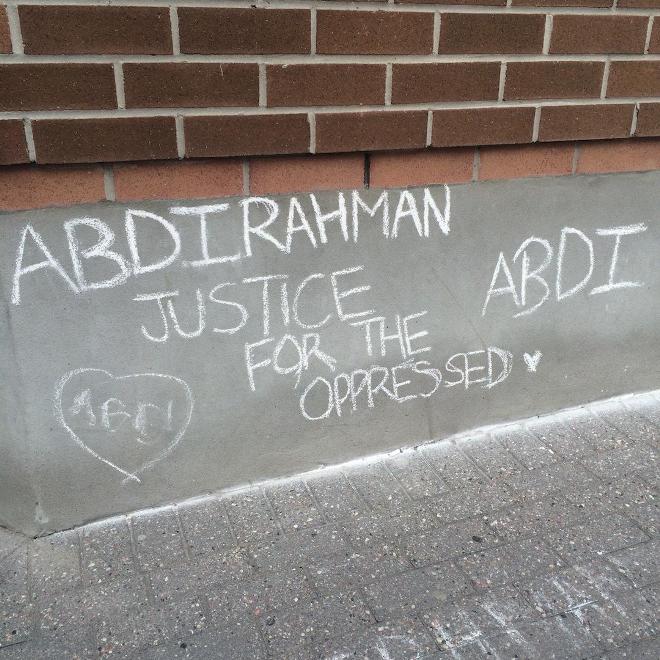
Tuesday August 2, 2016

Too many black men with a history of mental illness in Canada are dying at the hands of police
The bloody and violent death of Abdirahman Abdi at the hands of the Ottawa police last week is emblematic of a Canada-wide crisis surrounding race, mental health and policing. Law enforcement bodies remain a danger to the vulnerable, rife with anti-black racism and a penchant for the escalation of mental health crises. It’s unacceptable and time actions are taken to stop this pattern of abuse.On July 24, Abdi, a 37-year-old black, Somali-Canadian man, with unspecified mental health issues, was beaten by Ottawa police during an intervention.
Video from a bystander, as well as other eyewitness accounts, corroborate that Abdi did not appear threatening, but was beaten, bloodied, and handcuffed, and a witness saw one officer strike him repeatedly with “very heavy blows to the head and face and neck.” It was further reported that at least 10 minutes went by before Abdi, by then unconscious and bleeding, received any basic medical attention.
He succumbed to his injuries on Monday, when he was pronounced dead on at the Ottawa Hospital’s Civic Campus. At the time of the incident he had been holding only a piece of construction foam.
Though the investigation had not yet begun, Matt Skof, president of the Ottawa Police Association, nonetheless called the suggestion that racism played a role in Abdi’s death both “inappropriate” and “unfortunate.” He scolded critics for importing ideas of racism that come from the United States and he dismissed the notion that mental illness could have played a role in Abdi’s death.
Skof’s skepticism is uninformed. It does, however, perfectly exemplify the larger issue at hand: law enforcements’ continued unwillingness to engage with the realities of how race and mental health affect policing. This is far from solely an American problem. If we look beyond the Ottawa police officers’ treatment of Abdi, we see a larger pattern of harm committed by law enforcement officers against black people with mental illness.
Sociologists Wendy Chan and Dorothy Chunn found that Canadian police officers are more likely to use force on those who they perceive to be mentally ill; particularly if they are also racialized. Blackness, in particular, is dangerous in-and-of itself. According to a 2006 report by criminologist Scot Wortely, black residents, while just over 3 per cent of the Ontario population, make up around one-third of all of the deaths caused by police force, and are 10 times more likely to be shot by the police than white residents. Due to the double stigmatization at the intersections of blackness and mental health, death is too frequently the police’s solution to distress.
Far too many black people with mental health issues have lost their lives to inappropriate police responses across Canada.
O’Brien Christopher-Reid was shot eight times and killed in 2004, while in the midst of a mental health crisis. Reyal Jardine-Douglas, known by police to be suffering from mental illness, was killed in 2010. Michael Eligon was shot and killed while leaving a mental health facility in 2012. Ian Pryce, a 30-year-old with schizophrenia, was shot by the police in November 2013 while holding a pellet gun. Alain Magoire, a 41-year-old homeless man in the midst of mental distress, was shot to death by the Montreal police in 2013. In 2015, the police shot and killed Andrew Loku outside of his residence, a building leased by the Canadian Mental Health Association. None of the black men killed were armed with guns.
Race and mental health continue to be a death sentence in moments of distress. Abdi was said to have been a gentle and unthreatening man by members of his community. Given the witnesses’ accounts, it’s difficult to believe it was necessary to beat him to death and that other forms of non-violent de-escalation weren’t possible.
It’s clear Ottawa’s police force is either unable or unwilling to acknowledge the problems within their institution, and therefore will likely continue to needlessly take lives. This problem extends to the rest of the province, and the country.
The police should not be the first responders in mental health crises and the issue of their disproportionate violence toward the black communities can no longer go unaddressed. It’s time a higher body of government intervenes to ensure that Abdi’s tragic and brutal death was, at least, the last of its kind.